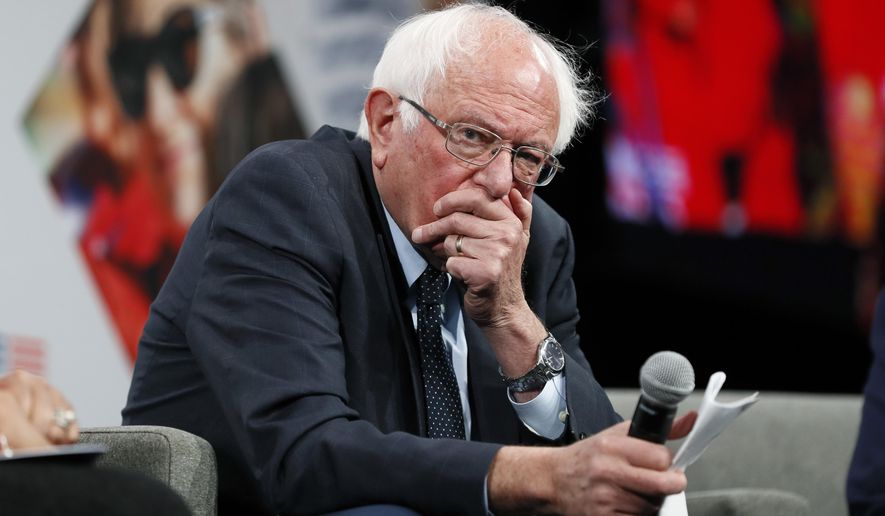Declaring the criminal justice system ruined by pervasive racism and “corporate profiteering,” Sen. Bernard Sanders proposed a massive overhaul Sunday that would free many drug convicts, abolish the death penalty and solitary confinement, and promote an unarmed “civilian corps” to replace the police for lower-level calls.
The Sanders campaign said the goal is to keep people out of prisons in the first place, with a goal of cutting the incarcerated population in half. For those who still land behind bars, he called for better conditions with a focus on helping them stay connected to society and to reintegrate faster when they are released.
Mr. Sanders announced the plan as he campaigned in South Carolina. He billed the proposal as an appeal to black voters, who make up a massive chunk of the state’s Democratic primary voters.
“This is an issue of such significance and such volatility that we need to bring it out in the open,” Mr. Sanders told his audience.
Criminal justice reform could be one of the hottest issues of the 2020 campaign.
President Trump last year signed the First Step Act, which covers much of the same ground as Mr. Sanders, cutting drug sentences and offering new rehabilitative services for those in prison.
Meanwhile, the leading Democrat, former Vice President Joseph R. Biden, has taken fire for his role in shepherding a get-tough bill in the Senate in the 1990s that surged police resources and stiffened sentences. Activists blame it for jailing a generation of black males amid drug-dealing violence.
Mr. Sanders’ plan is a complete reversal from that policy.
He argued that “institutional racism” has left the criminal justice system impossibly broken and that a total overhaul is needed. His plan checks a number of boxes on the liberal wish list.
Marijuana crimes will be exonerated and past convictions expunged under Mr. Sanders’ plan, and it will take a higher amount of other drugs to trigger prosecution at the federal level for what are still mostly state crimes.
Mr. Sanders would also create safe spaces for drug users, with needle exchanges and “safe injection” locations nationwide.
People still in prison will be granted the right to vote and access to taxpayer-supported scholarships, and will be allowed “unlimited” visits and phone calls with their families. Solitary confinement, which Mr. Sanders called “a form of torture,” would be banned. Those who do prison labor would be entitled to “living wages.”
One particular target for Mr. Sanders is for-profit prisons and detention centers. He adopted a rallying cry from the political left, which argues that corporations lobby for tougher criminal sentences and a harsher approach to criminal behavior, which has led to a higher rate of incarceration in the U.S. than in most other major developed nations.
“No more profiteering from locking people up. If we stand together, we can end the disastrous ‘war on drugs,’” he says in early excerpts of the speech, which his campaign released. “If we stand together, we can end cash bail. No more keeping people in jail because they’re too poor. If we stand together, we can enact real police department reform and prosecute police brutality.”
The Obama administration, late in its tenure, set a goal for phasing out private prisons’ involvement in federal Justice Department incarceration. The Trump administration reversed that policy in 2017.
The Obama administration’s Homeland Security Department, which runs a separate set of detention centers to hold some illegal immigrants while their cases are heard or while they are awaiting deportation, rejected the push to eliminate private facilities.
One challenge for Mr. Sanders will be the relatively small reach of the federal system.
About 2.1 million people are incarcerated, according to the Prison Policy Initiative, but only a little more than 10% of them are in federal prisons and jails. More than 60% are in state prisons, with the rest in local jails, where authorities detain a mixture of convicts and those awaiting trial.
Mr. Sanders said he will try to cajole states and localities to buy into his plans with promises of federal money. For those that refuse to scrap their cash-bail systems, he said, he will withhold existing funding.
Sen. Elizabeth Warren and Pete Buttigieg, the mayor of South Bend, Indiana, were also in South Carolina this weekend working to win over black voters.
Ms. Warren spoke at a black church in Columbia, where she talked about her path to becoming a candidate.
“I have been called to act,” she said.
• Stephen Dinan can be reached at sdinan@washingtontimes.com.




Please read our comment policy before commenting.